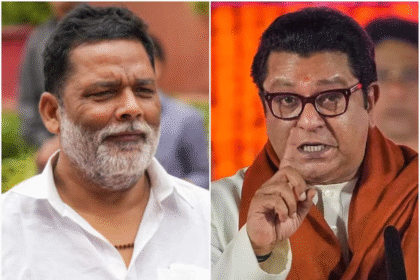Bengali Muslims Detained in Gurugram Holding Centres Without Clarity on Charges
Gurugram: On July 19, Hafizur Sheikh (41) had finished his shift as a cleaner outside a liquor store in Gurugram when he was stopped by policemen and interrogated. Sheikh answered all their questions, but then he was asked to produce his identity cards to “verify his citizenship”.
Despite having an Aadhaar card, a voter ID card and other identity documents on his phone, he was told that this was not enough. “The police wanted a physical copy,” his brother Amanur said. “My brother told them that he could bring the physical copy or they could accompany him to check the documents personally, but they did not listen and he was detained.”
Sheikh, from West Bengal’s Nadia district, is among hundreds of mostly Muslim migrants detained by the police in Haryana’s Gurugram. These men usually work as cleaners in Gurugram’s MNCs, ragpickers and public sanitation workers, or in some instances as domestic workers, and delivery agents.
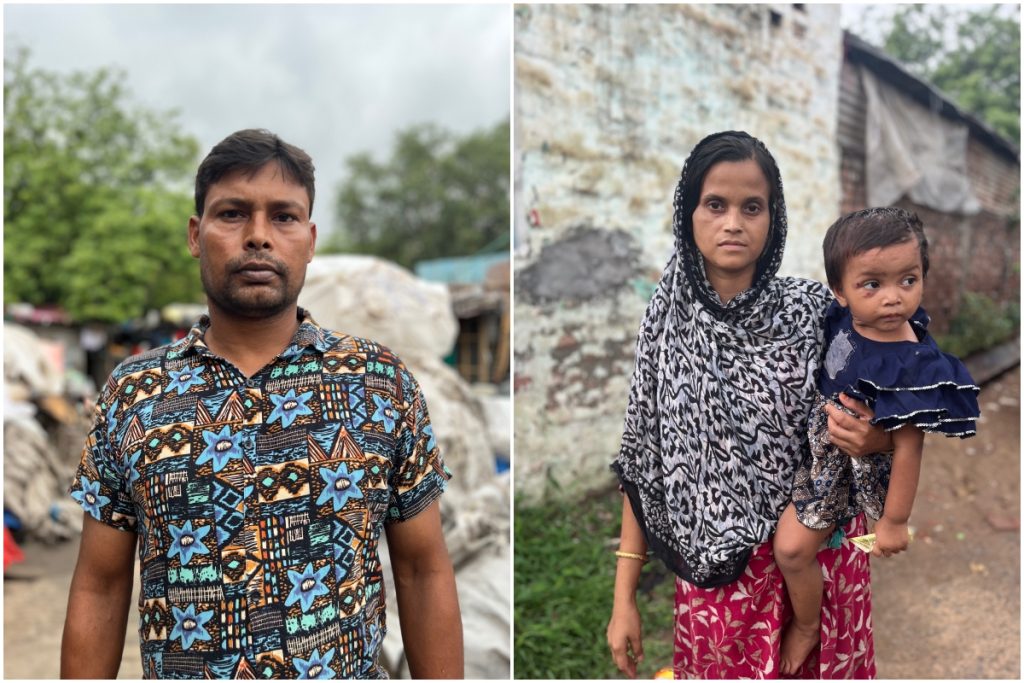
On July 19, police detained at least 74 migrant workers – 11 from West Bengal and 63 from Assam – who they suspect are undocumented foreign nationals from neighbouring Bangladesh. They were taken to what the police are calling “holding centres” – that rights activists say are akin to detention camps. “This camp [in Sector 10, Gurugram],” said advocate and Communist Party of India (Marxist–Leninist) member Supanta Sinha, “has over 200 detainees.”
On July 21, a two-member CPI-ML team visited one of the makeshift detention camps in Gurugram’s Sector 10 after they received “news of detention of scores of migrant workers purportedly for ascertaining their citizenship.” Sinha was a part of that team.
He alleged that the workers were being forced to live under inhumane conditions. A CPI-ML statement alleged that “similar exercises have been conducted in other parts of Gurgaon as well, with some zones housing over 200 detainees currently”.
These detentions appear to follow a Ministry of Home Affairs directive, said Sinha. They come in the backdrop of a nationwide drive against alleged undocumented foreign nationals. However, multiple reports show that Bengali-speaking Muslim migrants from West Bengal and Assam are facing the brunt of these drives.
At a recent protest in Kolkata led by Mamata Banerjee, the Trinamool Congress protested various attacks against migrants in Delhi (Jai Hind colony), NCR and Odisha. Banerjee dared the BJP to put her in a detention facility. She has also condemned these attacks on social media. “The second most spoken language in the country, Bangla, is also the second most spoken language of Assam,” she wrote.
“To threaten citizens, who want to coexist peacefully respecting all languages and religions, with persecution for upholding their own mother tongue is discriminatory and unconstitutional…”
TMC Rajya Sabha MP and head of the Bengali Migrant Board, Samirul Islam, accused the BJP of inciting anti-Bengali sentiments. TMC MP Mahua Moitra termed these detentions as illegal abductions.
‘Not detained, just withheld’
When asked about the charges under which the migrants are being detained, Gurugram Police PRO Sandeep Kumar said, “They are not detained. As per the guidelines of the Ministry of Home Affairs (MHA), certain holding centres have been created, and suspected Bangladeshis are being kept there. All basic necessities, including medical facilities, are being provided to them at the centres.”
In May, the Union government had directed states and union territories to identify, detain and deport undocumented immigrants across the country. Wion reported that the Centre gave states a 30-day deadline to verify documents of suspected undocumented immigrants and to initiate deportation proceedings against those who are unable to prove their citizenship. The MHA has also instructed states to establish district-level detention centres to hold such individuals. The ongoing crackdown appears to be in sync with this directive from the Union government.
Kumar said that the ‘suspected immigrants’ are being held as per government guidelines, although he did not specify what these guidelines are. When asked about the number of such centres, he said that there are currently four such “holding centres” across Gurugram, but he declined to comment on the number of people currently being held at these centres. While other senior officials either declined to comment or remained unavailable, Kumar did not share any specifics.
When asked about the process of verification, he said, “Among those kept in the centres, if anyone claims to be an Indian citizen, we contact the respective district magistrates (DMs). If the DM confirms their Indian citizenship, we release them. For those whose Indian citizenship is not confirmed, the deportation process will be initiated.”
Only five to six people, he confirmed, have been released from these holding centres so far after their citizenship was verified.
Hundreds flee Gurugram
A neighbourhood in Gurugram’s Khatola village, known for its large Assamese Muslim population. On one side of the road stand tall, eye-catching multi-storey buildings housing corporate offices like that of American Express, while on the other side lies a slum cluster housing Assamese migrants who work as cleaners in these offices.
Residents claimed that nearly 2,000 people used to live in the area. However, Only around 10-12 women were present, who were about to visit their husbands and other male relatives currently held in detention centres.
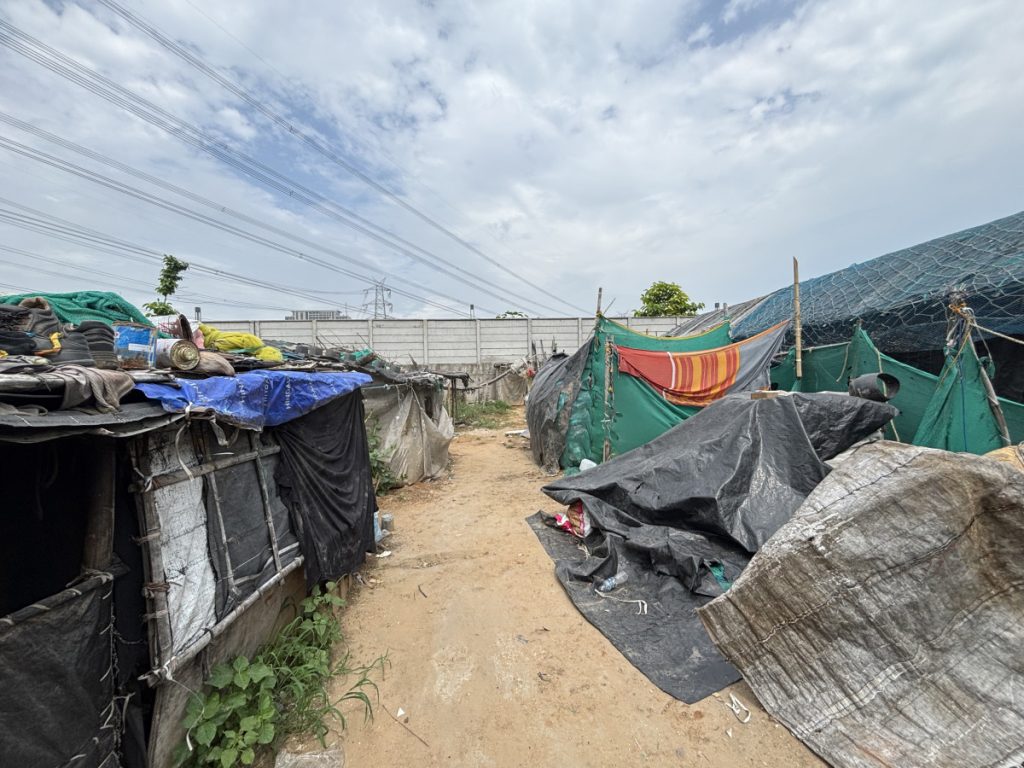
Barring a few, the entire neighbourhood has fled to Assam’s Dhubri following the recent crackdown.
“How can we leave while our husbands and other relatives are rotting in detention centres? Who knows what the police will do to them?” said Rohima, when asked why she had stayed behind when most others had fled. The women claimed that on July 19, police detained over 40 men from the area. Among those detained was Rohima’s husband, Nazrul Islam Mondal.
Rohima says Mondal was detained by the police despite having almost every document, even his name is in the National Register of Citizens.
Recalling the ordeal, Rohima said, “The police asked me where I am from. I said I’m Assamese. But they said, ‘Each one of you is from Bangladesh. We will take everyone.’ Then they took our men. We asked when they would be released, and the police replied, ‘Tere ko kya matlab hai? Tu bhaag idhar se (What do you have to do with this? Just get out of here).’”
The women alleged that the police took their husbands without checking any documents, even though they tried to show them multiple identity cards. Rohima added that her husband managed to call her from the detention centre and asked her to send all his documents. “But after that, his phone has been switched off,” she said.
“Since the day my husband was taken away, I haven’t been able to eat. My 12-year-old daughter hasn’t been to school because her father was the one who used to drop her off,” said Sayra Bano, whose husband Rokibuz Husain is also among those detained. Both Sayra and her husband work as domestic workers.
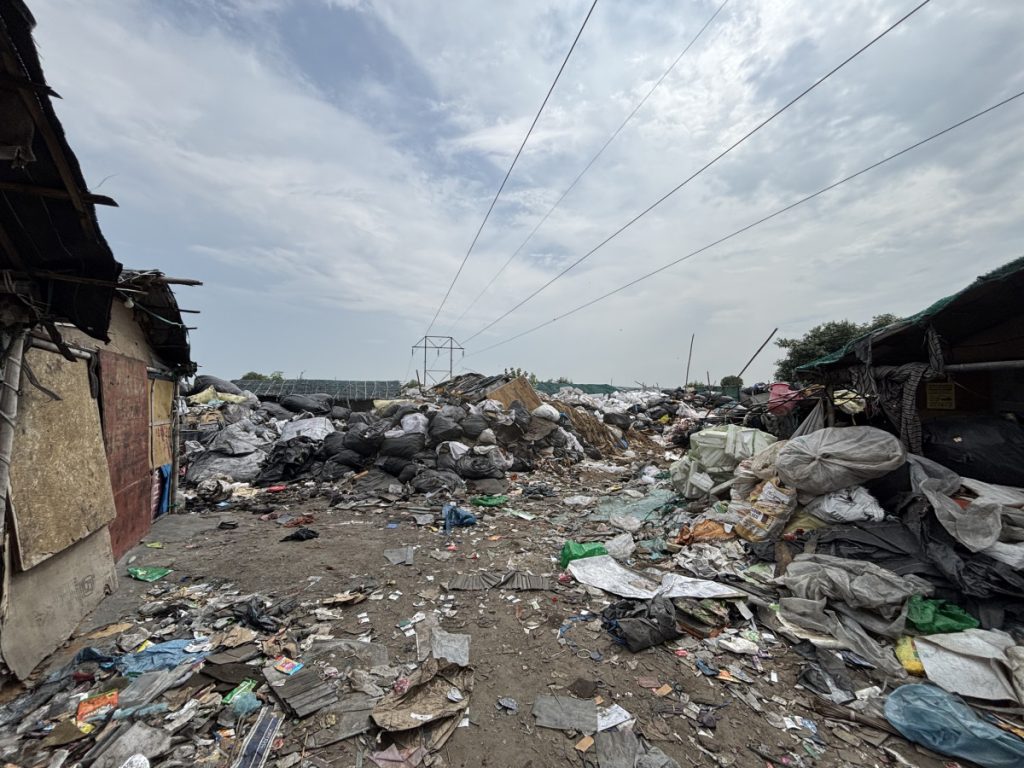
When asked if they plan to continue living in the area after their husbands are released, most of the women said they would leave once their family members return. “Who can live in such an environment, constantly under threat?” said a woman accompanying Bano.
The Wire spoke with a few detainees over a call. One of them said that he was picked up from Palam Vihar when he had voluntarily gone there to show his documents with a group of dozen Assamese migrants. Another said, “Even dogs are fed better.”
‘They detain us just because we speak Bengali’
Back in the ragpicker colony which houses people from West Bengal, Amanur Shaikh said, “They detain us just because we speak Bengali. Is speaking Bengali a crime in this country? If it is being treated as one, then we must raise our voices against it,” he said.
He added that the current atmosphere has forced people like him to live in constant fear.
“Because of the narrative that hass been created, anyone can come and threaten us by calling us Bangladeshis,” he said. He added, “If the government wants Bengali speakers to leave the NCR, they should just say so, we will go back to West Bengal peacefully. But please, don’t treat us in such an inhumane manner.”
Shaikh also alleged political motives behind the recent crackdown. “The BJP has repeatedly failed to form a government in Bengal despite years of effort. That’s why they are targeting Bengali people,” he said.
Rupa, aunt of Hafizul, has been living in Delhi for the past 15 years and works in a factory’s housekeeping department. She feels that Bengali people will have to leave now. “A few months back,” she said, “the police randomly came to my house and asked if I was Bangladeshi. When I denied it, they said someone had informed them that I was an ‘infiltrator’. I showed them my documents, and then they left.”
“Since they took my nephew, I haven’t been able to sleep. My husband hasn’t gone to work for the past three days out of fear that he might also be detained,” she added.
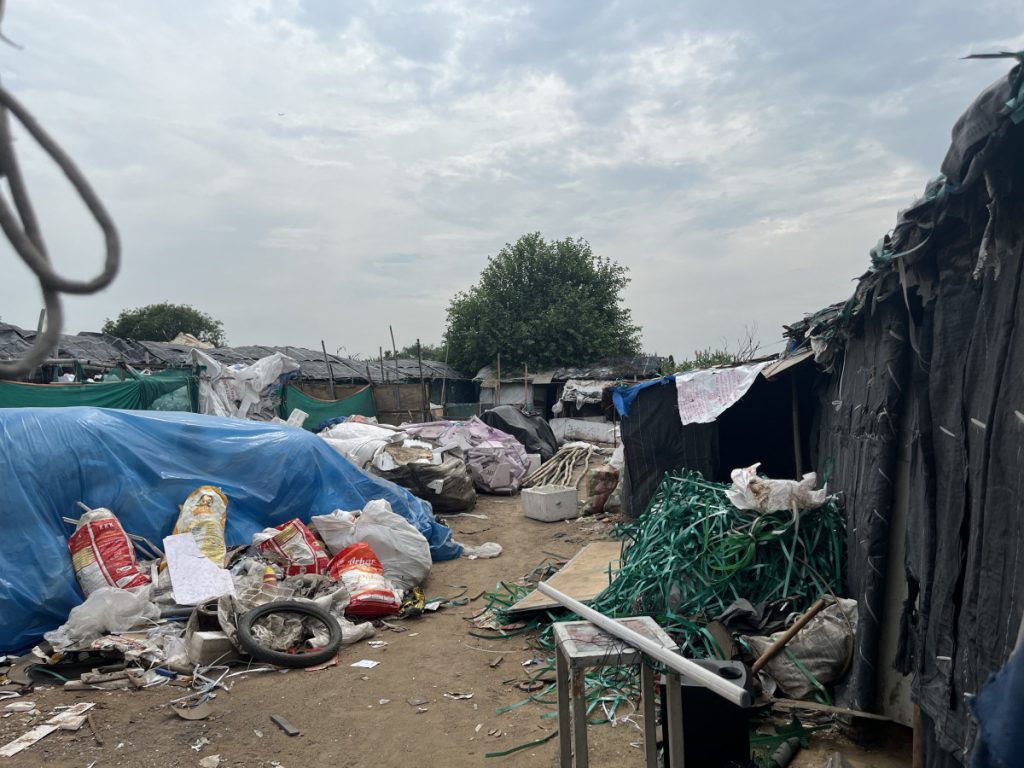
Their neighbour, Mijanur Molla, alleged that the police released his father-in-law, Soyed Molla (45), along with five others, after taking Rs 6,000 from each person. Soyed Molla and the others had been detained by the police last month.
Mijanur, who has been working as a cleaner in Delhi for the past four years, said, “The police picked up my father-in-law from his room despite him showing valid documents. They took away his papers, kept him in jail for 2-3 days, where they tortured him.”
“They torture us because they think every Bangla-speaking Muslim is Bangladeshi,” said Minajur.
“In our village, no one speaks Hindi, everyone speaks Bengali. Just because we don’t know Hindi doesn’t mean we are Bangladeshis,” said Rupa.
‘These are illegal detentions’
Advocate Sinha said, “After speaking to police officials, we found that as per the Ministry of Home Affairs guidelines, authorities can detain anyone they suspect to be an illegal citizen. They can keep them in custody for up to 30 days for identity verification.”
Calling these detentions illegal, he said, “As far as the constitutionality of these detentions is concerned, anyone being detained has the right to legal representation. You cannot detain someone without providing them a reason for the same. Nor can you keep them in custody indefinitely.”
“Every detention I have come across appears to be identity-targeted. All the individuals being detained are mostly Bengali-speaking Muslims, and their home states are either West Bengal or Assam,” he said.
He raised several questions: “Who is deciding their citizenship? On what basis and through which documents? Was any survey conducted before categorising these individuals? What parameters have been applied to label their documents as doubtful?”
Officials have remained completely silent on these questions. Sinha said that the CPI-ML is planning to approach the court on this matter. “We are exploring all the legal options available.”






